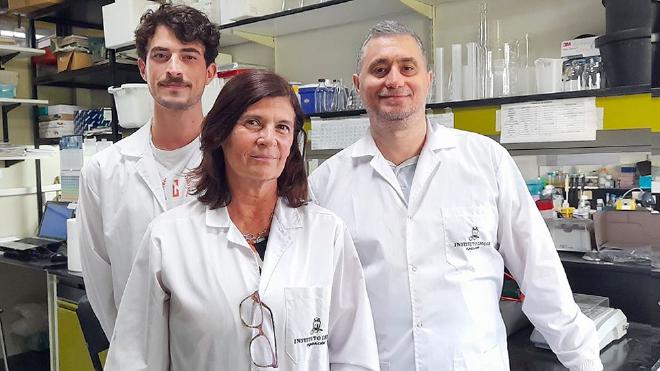

Scientific evidence indicates that Alzheimer’s disease can be conceived as a chronic inflammatory pathology affecting the central nervous system. While historically research on the leading neurodegenerative disease worldwide focused on the changes that neurons undergo in a specific area of the brain, in recent years, the role played by cells of nervous tissue, mainly astrocytes and microglia, which regulate inflammatory responses in the central nervous system, has gained relevance.
Now, a study published in Heliyon, led by scientists from CONICET, confirmed the role of inflammation in the development of Alzheimer’s and defined characteristic inflammatory profiles of the different stages of the disease.
“The finding opens new therapeutic perspectives, including the eventual possibility of modulating the inflammatory response to slow the progression of the disease,” says Laura Morelli, the leader of the work and a researcher at CONICET in the Institute of Biochemical Research of Buenos Aires (IIBBA, CONICET-Fundación Instituto Leloir) and the Laboratory of Brain Aging and Neurodegeneration of the Fundación Instituto Leloir (FIL). She added “Neuroglia (made up of astrocytes, microglia, and other cells that support neurons) secretes cytokines, substances that regulate the inflammatory response and can pass from the central nervous system to the peripheral blood, a process that is increased when the blood-brain barrier [which protects the brain from molecules circulating in the bloodstream] is disrupted, as occurs in patients with Alzheimer’s disease.”
As a result of a multicentric collaborative work involving professionals from various hospitals in Argentina and Spain, together with researchers from the Leloir Institute Foundation and CONICET, the study aimed to determine the levels of cytokines and chemokines in the blood of individuals grouped according to three distinct clinical stages: cognitively healthy; with mild cognitive impairment; and with a diagnosis of Alzheimer’s. The objective of the research, which has as its first authors the CONICET doctoral fellow Lorenzo Campanelli and the CONICET associate researcher Pablo Galeano, was to evaluate the inflammatory response during the progression of the disease.
The study involved individuals aged 60 years or older, who underwent a clinical, neuropsychological, and brain imaging evaluation. Blood was drawn from them, and using ultrasensitive techniques, the levels of 30 cytokines and chemokines were measured. Through advanced statistical analyses, and considering sex and age, the researchers identified that each clinical group exhibited a distinctive inflammatory profile. While individuals with mild cognitive impairment were characterized by an increase in eotaxin-1, involved in neurotoxicity, Alzheimer’s patients showed an increase in the pro-inflammatory interleukin IL-16. As a common factor, both groups exhibited elevated levels of the chemokine MDC, which regulates immune cell function.
“These findings highlight the central role of inflammation in the progression of Alzheimer’s disease and demonstrate the role of neuroglia at different clinical stages of the pathology,” emphasizes Morelli. She concludes that “the results of our work suggest the possibility of exploring the design of therapies that modulate the inflammatory response to slow the progression of the disease.”
Specialists from CONICET in the Executive Unit for Studies in Neurosciences and Complex Systems (ENYS, CONICET-GBA-UNAJ) also participated in the study.
Source: FIL
- The paper Blood levels of cytokines highlight the role of inflammation in Alzheimer’s disease was published in Heliyon. Authors: Lorenzo Campanelli, ∙ Pablo Galeano, ∙ Federico A. Prestia ∙ Carolina Cuesta ∙ Maria C. Dalmasso ∙ María Flores-López, ∙ Cristian Gona ∙ Nicolás Irureta ∙ Claudia Kairiyama ∙ Julieta Lisso ∙ Antonio Jesús López-Gambero ∙ Ines Mintz ∙ Nancy Medel ∙ Karen S. Campuzano ∙ Carolina Muchnik ∙ Gisela V. Novack ∙ Natividad Olivar ∙ Ivana Quiroga ∙ Nerea Requena-Ocaña ∙ Jose Antonio Reyes-Bueno ∙ Pedro Serrano-Castro ∙ Zulma Sevillano ∙ Patricia Solis ∙ Juan Suárez ∙ Ivana Villella ∙ Nancy Wukitsevits ∙ Eduardo M. Castaño ∙ Fernando Taragano ∙ Silvia Kochen ∙ Daniel G. Politis ∙ Luis I. Brusco ∙ Fernando Rodríguez de Fonseca ∙ Laura Morelli
- Citation: Referencia bibliográfica:
Campanelli, L., Galeano, P., Prestia, F. A., Cuesta, C., Dalmasso, M. C., Flores-López, M., … & Morelli, L. (2025). Blood levels of cytokines highlight the role of inflammation in Alzheimer’s disease. Heliyon, 11(2). https://doi.org/10.1016/j.heliyon.2025.e41725

